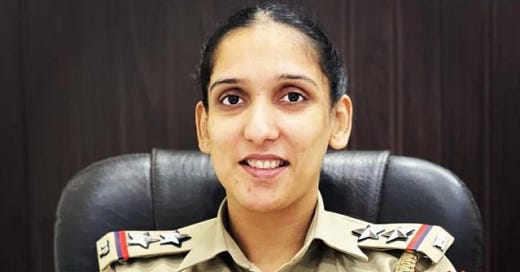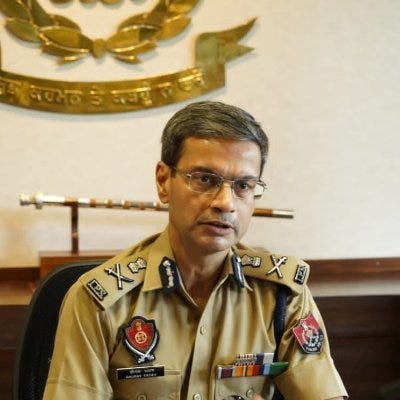Female Punjab Police Inspector Booked under NDPS—Alleges Sexual Harassment by Superiors
Transferring the NDPS case to the CBI will ensure an independent investigation, while a comprehensive and impartial inquiry into the sexual harassment and related allegations is equally crucial.

A Female Punjab Police Inspector Booked under NDPS
In a case that may be symptomatic of deep-seated issues within Punjab’s law enforcement, Inspector Arshpreet Kaur Grewal, the SHO of Kot Ise Khan police station in Moga district, has been booked under the Narcotic Drugs and Psychotropic Substances (NDPS) Act and the Prevention of Corruption Act, 1988. The FIR accuses her and two head constables of accepting a ₹5 lakh bribe to release suspected drug peddlers and tampering with narcotics evidence. However, Ms Grewal—who remains at large—has countered these allegations through a Facebook post, making serious claims of sexual harassment and retaliation by senior officers. Her counter-allegations reveal a troubling landscape of internal conflicts, corruption, and abuse of power within the police force.
Bribery Allegations and NDPS Case
Inspector Grewal, along with two head constables, has been accused of accepting a ₹5 lakh as illegal gratification to release drug suspects and underreporting seized narcotics. According to reports:
A raid led to the seizure of 3 kg of opium, with arrests of suspects Amarjit Singh, his brother, and son.
Allegedly, Grewal and the two constables settled for a ₹5 lakh bribe, releasing two suspects and altering the evidence log.
An FIR under the NDPS and Prevention of Corruption Act has been filed against Inspector Grewal and the two constables involved; however, all three remain at large despite ongoing police efforts to apprehend them. Moga Senior Superintendent of Police Ajay Gandhi confirmed to The Indian Express, "The inspector and both constables are absconding and have yet to be arrested."
Ms Grewal’s Social Media Counter-Claims
In a lengthy Facebook post in English, Inspector Grewal has portrayed the bribery case as retaliatory, sharing that her resistance to unethical orders and harassment had made her a target. Key points include:
Sexual Harassment Allegation: Grewal claims that a Deputy Superintendent of Police (DSP) level officer, her immediate superior, sexually harassed her, detailing an incident following a religious gathering.
Pressure to Discharge Murder Accused: She claims that she faced intense pressure from senior officers to release accused individuals in a murder case, documenting the the factum of these illegal orders in official records (Roznamcha).
Retaliation and Harassment: She describes sustained harassment following her refusal to comply, alleging a setup in the bribery case as a form of retaliation.
The Need for a Thorough, Independent Investigation
The arrest of Inspector Grewal and her subsequent allegations of sexual harassment cannot be ignored by Punjab’s government or the Director General of Police (DGP). The Punjab Police are actively working to dismantle the drug-trafficking networks threatening the state, and this case has re-catalyzed widespread belief in rural Punjab that no drug smuggling is possible without the overt or covert support of the local police.
The allegations of harassment demand an impartial inquiry, particularly as they have surfaced amid serious criminal charges, under the NDPS and the PC Act, against the lady Inspector. Brushing aside these claims without due process risks eroding public trust, necessitating both transparency and rigour in the inquiry.
Call for CBI Investigation in the NDPS Case
To uphold justice and ensure objectivity, the investigation against Inspector Grewal should be entrusted to the Central Bureau of Investigation (CBI). While the Punjab Police are professionally and technically equipped to handle the probe, even a high-level internal team or SIT might face allegations of bias. Assigning this sensitive case to the CBI would reinforce public confidence, ensuring an expeditious and fair investigation free from localised pressures, whether real or perceived. Delaying this decision risks obscuring vital evidence and diminishing the credibility of the findings; hence, this decision should be taken without delay.
Separate Inquiry for Sexual Harassment Allegations
The inquiry into the counter-allegations of sexual harassment should proceed independently and not be sidelined or deferred merely on account of the ongoing criminal investigation under the NDPS. Normally, an in-house committee, following the Vishakha guidelines, would be sufficient to address these claims; however, the complexities of this case merit a special approach. The Punjab Government would be well-advised to appoint a retired woman High Court Judge or a senior lady IAS officer to conduct this inquiry, ensuring all parties involved fully cooperate with the process.
While the aforesaid internal inquiry alone may not directly lead to punitive action, it could determine whether officers in positions of authority acted in ways that violated departmental code of conduct or breached the law. Should the inquiry reveal departmental misconduct, a regular departmental enquiry would be warranted, potentially leading to severe penalties, including dismissal from service. If criminal acts are revealed, an FIR should be promptly registered, and a separate SIT, preferably led by a senior female IPS officer, should conduct an expeditious investigation. Needless to say, such proceedings can only commence once Inspector Grewal is available to join the probe.
Upholding the Credibility of Punjab Police
The two distinct but intertwined cases of alleged corruption and harassment have unwittingly thrust the Punjab Police into the media spotlight. Under effective leadership of DGP Gaurav Yadav, Punjab Police has consistently bolstered its image and morale as an effective, professional law enforcement body; however, failing to address these issues comprehensively could dent its reputation. To safeguard public trust, it is essential to proceed with transparency and decisiveness. Handing over the NDPS matter to the CBI for an independent investigation would ensure that any undue influence is kept at bay, while a thorough and impartial inquiry into the sexual harassment and related allegations is equally vital. Moving forward, a swift, unbiased inquiry and investigation and consistent accountability will best serve both Punjab Police and the people of Punjab. We are hopeful that these actions will be initiated without delay.
Citations:
[1] Hindustan Times: Punjab Woman Cop Bribe Allegations
[2] Indian Express: Sexual Harassment and Bribery Counterclaims
[3] Twitter Updates
[4] YesPunjab: SP Refutes Allegations





Allegations from both sides are of the nature that the accused has to do more to prove innocence than prosecution. Although, sexual harrassment of an Inspector level woman seems improbable, but she has written it in rojnamcha, which makes it credible. Seniors putting pressure to save a murder accused can't be ruled out. Problem is that if you give this case to CBI, they will take 25 years and will come with no results. Corruption in police, any state or central, from top to bottom, is not a surprise at all. The intensity of police power is so high that it is not easy to manage it. You can't dilute it, it will make police toothless. If we have politicians controlling it, then there is no accountability of police. If we give free hand to police, it will misuse power against poor. Not sure if there is a permanent solution.